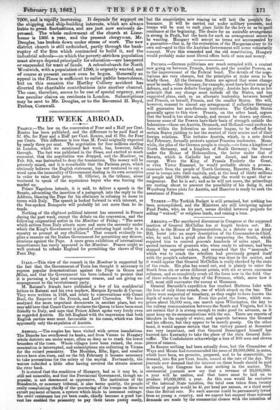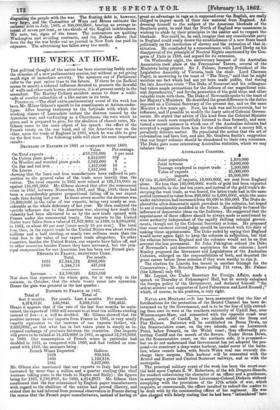THE WEEK ABROAD.
FneascE.—The law on the conversion of Four and a Half per Cent. Rentes has been published, and the difference to be paid fixed at Sf. 40c. for Four and a Half per Cent. Rentes, and 4f. 20c. for Fear per Cents. This difference is less than M. Fould originally expected nearly three per cent. The negotiation for four millions sterling in London, which we mentioned last week, has, however, fallen through. The fact was published in the Times, and excited so mach comment, that the negotiation was dropped, and the Moniteur, on Feb. 8th, was instructed to deny the transaction. The money will be privately raised, and it is remarkable that the Parisian press, which obviously believes the English statement, has not ventured to say a word upon the immorality of Government dealing in its own securities in ()icier to raise their price. M. 011ivier, in the tribune, alone ventured to speak of the mysterious buyer who was forcing the market up. Prince Napoleon intends, it is said, to deliver a speech in the Senate, advocating the insertion of a paragraph into the reply to the Address, blaming the Pope for his obstinacy in refusing to come to terms with Italy. The speech is looked forward to with interest, as the free-spoken Bonaparte will probably let out more than he in- tends.
Nothing of the slightest political interest has occurred in France during the past week, except the debate on the conversion, and the following enigmatical notice in the Moniker of Friday; "The news which arrives from Italy attests more and more the necessity under which the King's Government is placed of restoring legal order in a country so prompt at any ebullition." That remark evidently im- plies a censure on the Italian Government for laermitting any demon- strations against the Pope. A more gross exhibition of international impertinence has rarely appeared in the Moniker. France might as well pretend to rebuke England for permitting the shows of Guy Tans Day.
ITALY.—ThilS view of the remark in the Moniker is supported by the fact that the Government. of Turin has thought it necessary to repress popular demonstrations against the Pope in Genoa and and that the Government has been induced to protest that it is pursuing a loyal and courageous course, and not giving en- couragement to the revolutionary party.
M. Ratazzi's friends have published a few of his confidential letters to Ratazzi and hi q own nephew, Marquis Eynardo di Cavour. They were written in 1848, and relate to conversations with Count Buol, the Emperor of the French, and Lord Clarendon. We have analyzed the more important documents in another place, but we may add here that Count Cavour declares the Queen to have been most friendly to Italy, and says that Prince Albert spoke very freely even as regarded Austria. He left England with the impression that both English parties were most favourable to his cause, which was then apparently only the expulsion of Austria.
AIISTRIA.—The empire has been visited with severe inundations. The Danube has overflowed its banks, and from Vienna to Hungary whole districts are under water, often so deep as to reach the lower branches of the trees. Whole villages have been ruined, the com- munication is interrupted, and subscriptions are collecting in Vienna for the ruined peasantry. The Moildau, Elbe, Eger, and smaller rivers have also risen, and on the 8th February it became necessary to take precautions for the safety of the capital. Fortunately, the waters subsided a little after having covered the streets nearest the river bank.
It is stated that the condition of Hungary, bad as it may be, is still not miserable, and that the Provisional Government, though un- popular, is not denounced as oppressive. The institution of the Standrecht, or summary tribunal, is also borne quietly, the people really complaining chiefly of the quartering of the troops on them to extort payment of taxes, a system which leads to incessant outrage. No overt resistance has yet been made, chiefly because a good har- vest has enabled the peasantry to pay their taxes prettir but the conscription now coming on will test the people's for- bearance. It will be carried out under military pressure, and troops will be sent to each place liable for the levy so as to quell resistance at the beginning. The desire for an amicable arrangement is strong in Pesth,laut the basis for such an arrangement seems to be wanting. Hungary will accept no terms not accompanied by a guarantee—that is, by the restoration of the Hungarian army to its own soil—.and to this the Austrian Government will never voluntarily consent. Were this conceded and the old constitution, Hungary would probably make most liberal offers both of men and money.
PitusstA.—German politicians are much occupied with a contest now going on between Prussia, Austria, and the smaller Powers, as to the improvement of the Federal bond. The details of the nego- tiations are very obscure, but the principles at stake seem to be briefly these. All the German States are agreed that some change mustle made,—that Germany, for example, must have better means defence, and a more definite foreign policy. Austria lays down as her principle that any change must include all the States, and has suggested plans, such as an alternate leadership between herself anePrussia, or herself, Prussia, and the smaller States. She will, however, consent to almost any arrangement if collective Germany will guarantee her non-German territories. The Catholic States generally agree to this view. Prussia, on the other hand, argues that the bond is too close already, and cannot be drawn any closer, because some of the Powers have their basis of strength outside the federation—these are Austria, Denmark, and Holland—and prefers to form within the federation an interior league, to be effected by certain States yielding to her the control of their armies and of their foreign relations. This irritates Austria, which, in a note dated 2nd February, formally protests against Prussian tendencies. Mean- while, the plan of the German people is simple,—to form a kingdom of North Germany, and a kingdom of South Germany; the former under the House of Hohenzollern, the latter under that of Bavaria, which is Catholic but not Jesuit, and has shown energy. Were the King of Prussia Frederic the Great, or even Victor Emanuel, he would probably obtain a pronen- ciamiento from the people of North Germany, Hanover, Hesse, &c., pour in troops into their capitals, and, at the head of thirty millions of people and 700,000 men, challenge the world to upset that ar- rangement. But he is not; and as he will not move, the princelings are casting about to prevent the possibility of his doing it, and Wurzburg forms plots for Austria, and Hanover is ready to seek the assistance of France.
TIIRHEY.—The Turkish Budget is still promised, but nothing has been accomplished, and the Ministers are still intriguing against Fuad Pasha, who, on his part, seems divided between projects for selling " wakoof," or religious lands, and raising a loan.
Amenica.—The smothered discontent in Congress at the supposed inaction of General McClellan has at length broken out. Mr. Gurley, in the House of Representatives, in a debate on an Army Bill, burst into an angry description of the Commander-in-Chief, who, he said, had a great plan for conquering the Smith, which required him to control generals hundreds of miles apart. He quoted instances of generals who, when ready to advance, had been stopped by superior orders, and remarked that the " anaconda " which was to crash the rebellion had previously gorged itself with the people's substance. Nothing was done in the matter, and it would appear that General McClellan is really checked by the state of the roads. His plan has oozed out, and is plainly to enter the South from six or seven different points, with six or seven enormous columns, and so completely crush all the force now in the field. One of these columns is the Army of the Potomac, which, move how it will, must still encounter the enemy at Manassas.
General l3urnside's expedition has reached Hatteras Inlet with the loss of only three vessels, one of which struck on the bar. The pilots were suspected of treachery, as they ought to have known the depth of water on the bar. From this point the force, which com- prises about 15,000 men, can march upon Wilmington, the key to the railway communication between the South and Virginia, but it is not certain that. it is strong enough to make good its advance, as it must keep up its communications with the sea. There are reports of blunders in the supply of water, and quarrels between the General and his officers, but they appear to be merely gossip. On the other hand, it would appear certain that the victory gained at Somerset was very important, and that General Beauregard himself has hurried into Kentucky to take the place of the slain General Zolli- coffer. The Confederates acknowledge a loss of 300 men and eleven pieces of cannon.
In finance nothing had been actually done, but the Committee of Ways and Means had recommended the issue of 20,000,0001. in notes, which have been, we perceive, prepared, and to be convertible, on demand, into Six per Cent. bonds, issued at the rate of the day. The journals now demand that the interest on these bonds should be paid in specie, but Congress has done nothing in the matter. The commercial journals now say that a revenue of 30,000,000/. a year will be useless, and that taxes must be laid on .to produce 50,000,000/. a year. As this sum would be exclusive of the internal State taxation, the total sum taken from twenty millions of people would be 4/. per head per annum, or a third more than the British rate. No such amount could be permanently levied from so young a country, and we cannot but suspect these colossal demands are made by the commercial classes with the intention of disgusting the people with the war. The floating debt is, however, very large, and the Committee of Ways and Means estimate the national debt in July, 1863, at 300,000,0001., bearing an average in- terest of seven per cent., or two-thirds of the Eughsh indebtedness. We note, too, signs of the times. The contractors are quitting Washington and avoiding contracts, and the Tribune affirms that from the day the war broke out no journal in New York has paid its expenses. The advertising has fallen away too much.































 Previous page
Previous page